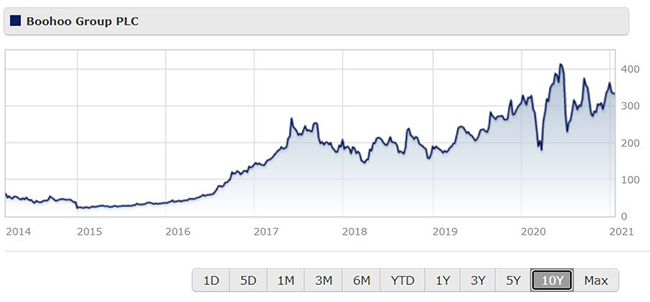
High street shops may be shut but retailers, especially online ones, have been busy of late. Our stock of the week, as voted for by our Twitter followers is Boohoo (BOO), which has just bought Debenhams brands and website (but not the stores) for £55 million. Its latest acquisition targets include distressed assets from the Arcadia administration, including Dorothy Perkins, Wallis and Burton.
The moves reflect the shakeout on the high street after lockdown dealt a fatal blow to many already struggling businesses, but also reflects the huge shift online that was in motion even before Covid-19.
Boohoo had been one of the recent success stories of the Alternative Investment Market (Aim), like recent stock of the week YouGov (YOU) and drinks maker Fevertree (FEVR), with shares rising 10-fold in five years to around 400p in June last year.

Modern Slavery Allegations
But controversy struck in summer 2020 over working conditions at its Leicester factories, knocking 25% off the share price. While Boohoo has now cut ties with 64 of its suppliers in the city, the shares are still below the level before the row erupted. Investors can be quick to move on from controversies, but the episode has shone a harsh light on the cost of “fast fashion” and shown retailers to be vulnerable from an ESG point of view.
Ratings agency Sustainalytics, which is owned by Morningstar, assigns the company an overall ESG risk rating of “Medium” - below “High” and “Severe” as clothes retailers often encounter problems over workers' rights in developing countries where most garments are made. But on a Controversy score, Boohoo has a “High” rating, the second highest, because of its supply chain issues in the UK. “It is one of the few known cases of modern slavery in an OECD country to have reached such a magnitude, both financially and from a regulatory perspective,” Sustainalytics says.
While Boohoo has hired former judge Lord Leveson – who presided over an inquiry into newspaper phone hacking – to oversee a shake-up of its working practices, Sustainalytics says this does not go far enough to address the issues brought to light last year – and there’s a risk of them happening again. “We have a low level of confidence in the company’s ability to effectively mitigate impacts and risks and to prevent a reoccurrence,” its analysts say. To repair its reputation, Sustainalytics says there needs to be signs of meaningful improvements in wages and working conditions – and Boohoo needs to sign up to codes like the Ethical Trading Initiative, a global standard for labour relations.
What about the fashion industry in general? Morningstar analyst Jelena Sokolova says the social and environmental impact of the clothes industry is a key concern for shoppers – but they may still be unwilling to pay more for sustainably sourced clothes - or even cut down on the number of garments they buy (which is part of the problem of high turnover). Sokolova says that the bigger players like H&M and Inditex are in a better position than their smaller rivals to absorb the higher costs of producing more sustainable products (and paying their suppliers more).
Before the scandal, Boohoo was widely owned by a number of fund managers keen to tap into its high-growth story. One of its biggest shareholders, Aberdeen Standard, sold out of the company I the wake of the scandal, describing Boohoo’s response as inadequate. Small-cap and mid-cap focused fund manager Merian remains a key investor through funds like the Silver-rated Merian UK Mid Cap fund, which allocates nearly 8% of its portfolio to Boohoo.


























